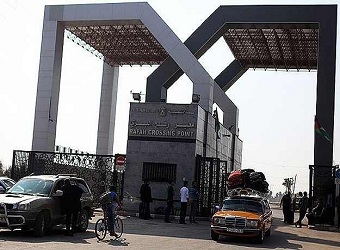Egyptian authorities closed the Rafah border crossing with the Gaza Strip on Tuesday morning after it was opened for three consecutive days, according to the Gaza borders and crossings committee.
The committee released a statement noting approximately 2,000 passengers left the besieged coastal enclave and about 1,500 arrived from Egypt during the three-day opening.
The statement added that Egyptian authorities denied 158 passengers entry into the Gaza Strip for unspecified reasons.
Throughout the opening, priority was given to “humanitarian cases” including medical patients, students studying outside of Gaza, and expatriates, in addition to holders of Egyptian passports.
Egypt has upheld an Israeli military blockade on the Gaza Strip for the majority of the past three years, since the ousting of former President Muhammad Morsi in 2013 and the rise to power of President Abd al-Fattah al-Sisi in Egypt.
While the Egyptian border has remained the main lifeline for Gazans to the outside world, Egyptian authorities have slowly sealed off movement through the border since Morsi was toppled by the Egyptian army.
Due to the constraints on Palestinian movement through the crossing, many Gazans are commonly barred from leaving or entering the besieged coastal enclave, some for months at a time, as the crossing is only periodically opened by Egyptian authorities, stranding Palestinians on both sides of the crossing during closures.
In 2015, the Rafah crossing was closed for 344 days. The crossing has been reopened on a more regular basis since the beginning of 2016.
The near decade-long Israeli blockade has plunged the Gaza Strip’s more than 1.8 million Palestinians into extreme poverty and some of the highest unemployment rates in the world.
Gaza’s infrastructure has yet to recover from the devastation of three Israeli offensives over the past six years. The slow and sometimes stagnant reconstruction of the besieged coastal enclave has only been worsened by the blockade, leading the UN in September to warn that Gaza could be “uninhabitable” by 2020.
Source: Ma’an News Agency
